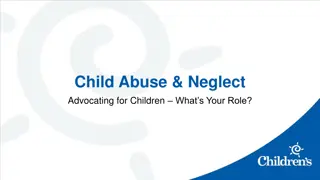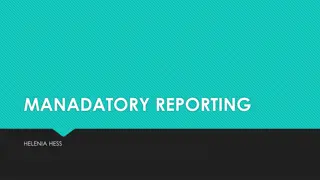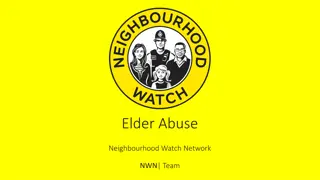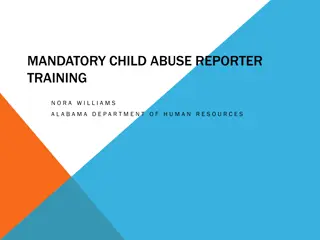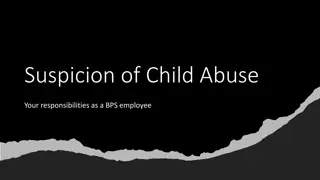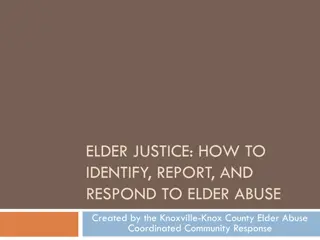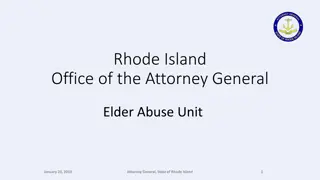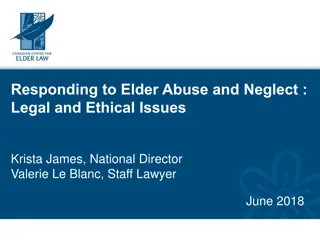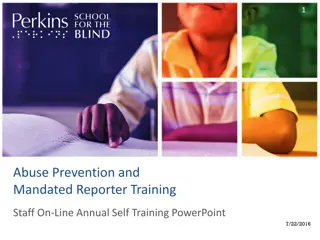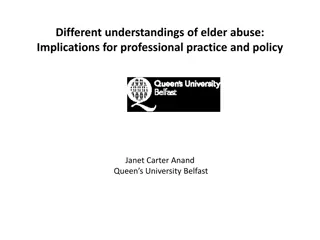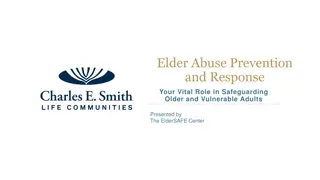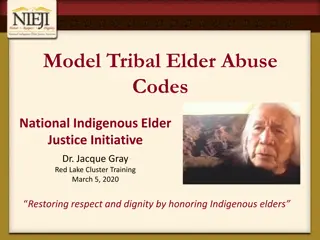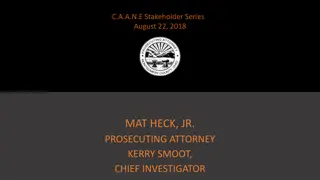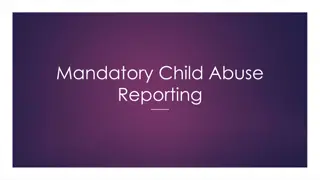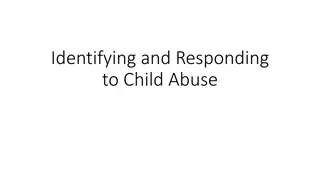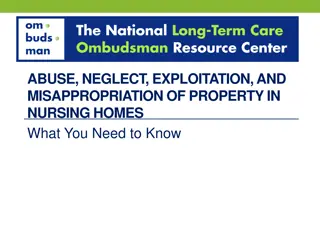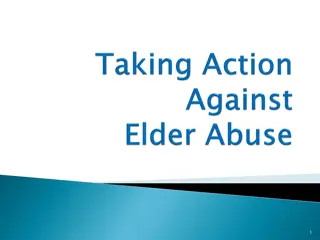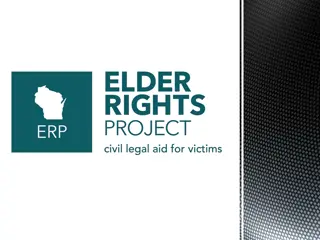Understanding Mandatory Reporting for Elder Abuse
Mandatory reporting requirements for elder abuse under ORS 124.060 mandate that any public or private official encountering suspected abuse involving individuals aged 65 or older must report it. Exceptions for reporting exist for certain professions, but attorneys are still obligated to report. Reporting obligations apply both in professional and personal capacities, regardless of mental capacity or vulnerability of the elder. Reasonable cause to believe in elder abuse cases is defined loosely and based on reasonable suspicion.
Download Presentation

Please find below an Image/Link to download the presentation.
The content on the website is provided AS IS for your information and personal use only. It may not be sold, licensed, or shared on other websites without obtaining consent from the author. Download presentation by click this link. If you encounter any issues during the download, it is possible that the publisher has removed the file from their server.
E N D
Presentation Transcript
Elder Abuse Reporting ORS 124.060
ORS 124.060 Any public or private official having reasonable cause to believe that any person 65 years of age or older with whom the official comes in contact has suffered abuse, or that any person with whom the official comes in contact has abused a person 65 years of age or older, shall report or cause a report to be made in the manner required in ORS 124.065. Nothing contained in ORS 40.225 to 40.295 affects the duty to report imposed by this section, except that a psychiatrist, psychologist, member of the clergy or attorney is not required to report such information communicated by a person if the communication is privileged under ORS 40.225 to 40.295. An attorney is not required to make a report under this section by reason of information communicated to the attorney in the course of representing a client if disclosure of the information would be detrimental to the client.
When is this applicable? Although we are mandatory reporters due to being attorneys
When is this applicable? Although we are mandatory reporters due to being attorneys Reporting is for work AND personal life
When is this applicable? Although we are mandatory reporters due to being attorneys Reporting is for work AND personal life This means 24/7
Elderly ORS 124.050(2) Duty to report is for ALL adults 65 and older who are NOT in a Long Term Care facility Mental capacity / vulnerability of person does NOT matter
Public or Private Official ORS 124.050(9) defines who is included as a mandatory reporter Note: Public or private is a term ORS does not differentiate definitions for public v. private official
Reasonable Cause to Believe Not defined in ORS Rules of Professional Conduct ORPC 1.0(L) - "Reasonable belief" references when the lawyer believes the matter in question and that the circumstances are such that the belief is reasonable. Case Law Berger v. State Office for Services to Children & Families cite in materials Reasonable cause = reasonable suspicion Child abuse case
Official Comes in Contact Legal duty requires actual contact with alleged victim or alleged perpetrator NO duty if contact is with a 3rdparty Note: no definition of contact Contact when? Prior client? Current client?
Official Comes in Contact Attorney does not need to be in legal role; also have duty in personal life (ie: grocery store). There are no exceptions for attorney to get out of required reporting for contact in attorney s personal life Issue of whether to report does not necessarily end when there is no duty to report Moral code Prevention of civil liability Prevent harm
Abuse Note: assumption of abuse in statute, but it is really alleged abuse
Abuse ORS 124.050(L) non-accidental physical injury or pain neglect abandonment sexual abuse verbal abuse
Abuse ORS 124.050(L) **financial exploitation private indecency involuntary seclusion wrongful use of physical or chemical restraints
Shall Report or Cause a Report to be made Shall , not may ORS 124.065 discusses the method to report Must be an oral report Made immediately By telephone or otherwise to the local office of DHS or to a law enforcement agency Within the county where the person making the report is at the time of contact.
If known, reports shall contain Name and address of elderly person Names and addresses of persons responsible for care of elderly person Nature and extent of abuse (including previous abuse) Explanation given for abuse (if any) Anything helpful for report to establish cause of abuse Identity of the perpetrator
Now we get to the exceptions .
But first Things to remember: ORPC 1.2(a): attorney must follow client s decisions concerning the objective of the client s representation and is required to consult with the client as to the means of pursuing such objectives ORPC 1.4(b): Attorney is required to explain information to the client to the extent reasonably necessary to make an informed decision ORPC 1.6: For the most part, attorney cannot discuss information relating to representation of the client unless given consent by client
1stException: Privilege Not required to report if stems from attorney-client privilege ORS 40.225 (Oregon Evidence Code 503) Confidential communication: communication not intended to be disclosed to 3rdparty other than those to whom disclosure is in furtherance of the rendition of professional legal services to the client or those reasonable necessary for the transmission of the communication Client holds the privilege and can prevent disclosure of confidential communications Note: there are some communications that are not privileged under ORS 40.225(4) No privilege if 3rdparty is in the room
Privilege, but If privileged, but client wants to report then the attorney is required to report under ORS 124.060 if the duty is triggered. If not triggered, attorney still may need to report under ORPC 1.2(a) which requires lawyer to comply with client s decisions
2ndException: Not Required to Report if Disclosure if Detrimental to Client Attorney may still make report ORCP 1.6 Confidentiality issue still applies Does not say most detrimental of possible outcomes ; Detrimental is broad! No balancing test required Subjective to client and possibly even attorney **Not offered to any other official specific to attorneys
What is an example? Son lives with Mom. Mom tells Attorney that Son is using her funds without her consent and she is aware of financial abuse. Mom does not want report made because it would affect the relationship with her son and grandchildren.
What is an example? Not required to report under ORS 124.060 Cannot report under ORPC 1.6 confidentiality
Penalty Attorney s failure to report: Class A violation = Penalty of $2,000 Possibly subject to discipline (May also be subject to discipline if you make the report using confidential information, so be aware of interplay) Abuser = Treble Damages (eek!)
Conclusion It is really important to do the analysis! It is worth the time to figure out the right route. Feel free to contact the Oregon State Bar for questions on reporting.

 undefined
undefined



